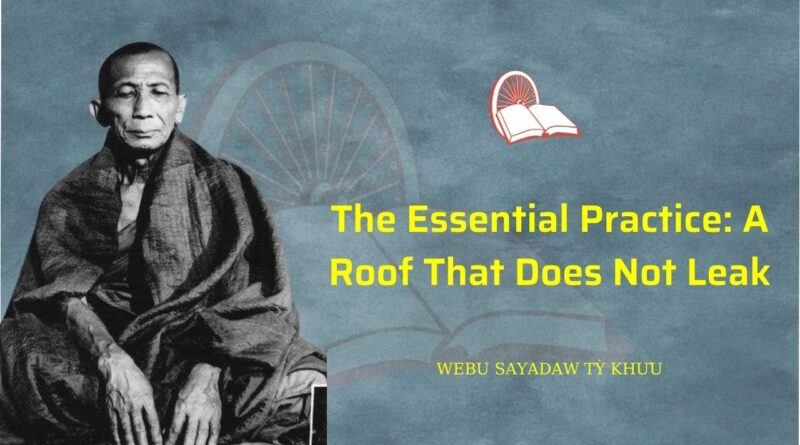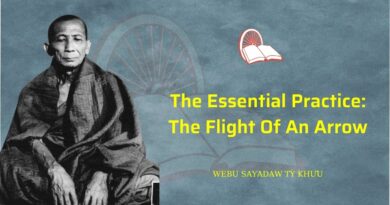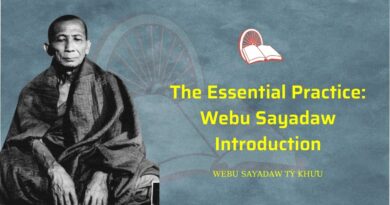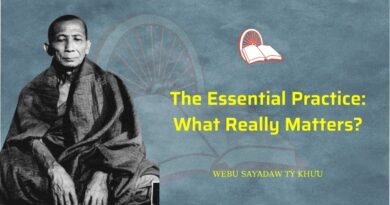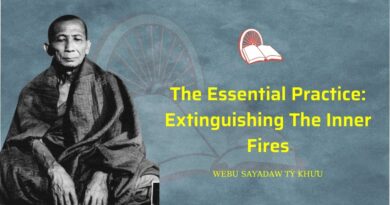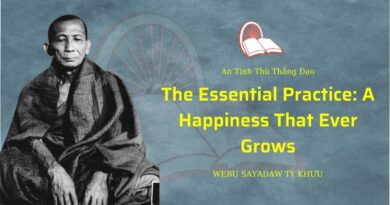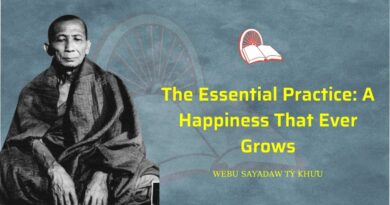A Roof that Does Not Leak
WEBU SAYADAW: The contents of the Three Baskets of the sacred scriptures taught by the Buddha are so vast that it is impossible to know all they contain. Only if you are intelligent will you be able to understand clearly what the monks have been teaching you out of great compassion. You have to pay attention only to this.
DISCIPLE: Sir, we don’t quite understand what you mean by: “You have to pay attention only to this.”
SAYADAW: Let me try to explain in this way. If you build a house, you do put a roof on it, don’t you?
D: Yes, sir, we cover our houses with roofs.
S: When you put the roof on you make sure that it is watertight, don’t you? If you cover your house well and it rains a little, will the roof leak?
D: No, sir, it won’t.
S: And if it rains very hard, will the roof leak?
D: No, sir.
S: And when the sun burns down, will it still give you good shelter?
D: It will, sir.
S: Why is this so? Because your roof is well built. Will you be able to know whether your roof is leaking or not after it rains?
D: Yes, sir, when it rains it is easy to find out.
S: You see, you think that the teachings of the Buddha are vast and varied, but really they are just one single way of escape from suffering. Only if you take up one object of meditation given by the Buddha and pursue it with steadfast effort to the end, can you justly claim that your roof is not leaking anymore. If your roof is not rain-proof yet, you have to be aware of this. There must be many houses in your neighborhood and they all have roofs. What are the materials used for roofing?
D: There are corrugated iron roofs, there are tiled roofs, there are houses roofed with palm leaves of bamboo.
S: Yes, of course. Now, if a palm-leaf roof is well built, is it reliable?
D: Oh yes, sir, it won’t leak.
S: If a tin roof is well assembled, is it rain proof?
D: Yes, sir, it is.
S: What about a well-made tile roof?
D: No rain will come through, sir.
S: What about bamboo roofs or roofs made out of planks?
D: If they are well done, they are watertight, sir.
S: So, if you take the roofing material you like best and build a good roof, will it give you shelter when it rains and when the sun shines?
D: If we build it well, it will not leak, sir.
S: We are building roofs because we don’t want to become wet when it rains and we want to avoid the scorching sun. The teachings of the Buddha are available now. Take up one of the techniques the Buddha taught, establish steadfast effort and practice. Only if you are steadfast does your practice resemble a roof, and greed, aversion and delusion cannot leak through. Only if the roof is not leaking can we say that we are sheltered. If the roof is still leaking, is this because it is good or because it is not so good?
D: Because it is not so good, sir.
S: Is it leaking because the palm leaves are not a good roofing material?
D: No, sir, palm leaves are a good roofing material.
S: Or is it because corrugated iron, or tiles, or bamboo, or planks are not suitable as roofing materials?
D: No, sir, all these are quite all right.
S: Then why is the roof leaking?
D: Because it isn’t well built, sir.
S: But, of course, the mistake is made now. Is it difficult to repair it?
D: If one is skillful, it is quite easy, sir.
S: Tell me then, if it leaks in a certain place, what do you have to do?
D: We have to patch up the leak, sir.
S: It is just the same in meditation. Now that you exert effort, there is no leak; you are safe. If greed, aversion and delusion still drip in despite your practicing the teachings, you have to be aware of the fact that your roof is not yet rain-proof. You have to know whether the roof you built for your own house is keeping the rain out or not.
D: Sir, we all have the roofing materials, but the roof is still leaking. We would like to know the technique of building a good roof.
S: Don’t build a thin shaky roof, build a thick strong roof.
D: How are we to build a thick strong roof, sir? While we are sitting here like this, we still have to endure being drenched by the rain.
S: The wise people of old practiced the teachings without allowing their efforts to diminish in any of the four postures — sitting, standing, lying down and walking — and they kept up such a perfect continuity of awareness that there never was any gap. You too have to practice in this way. The disciples of the Buddha established awareness of the spot and then did not allow their minds to shift to another object. Now, can the rains of greed, aversion and delusion still affect those who are steadfast?
D: No, sir, they can’t.
S: If you establish the same quality of awareness whether sitting, standing or walking, will the rain still be able to penetrate your protecting roof?
D: Sir, please teach us the technique which will give us shelter.
S: Tell me: all of you are breathing, aren’t you?
D: Oh yes, sir, all are breathing.
S: When do you first start breathing?
D: Why, when we are born of course, sir.
S: Are you breathing when you are sitting?
D: Yes, sir.
S: Are you breathing while you are standing, walking and working?
D: Of course, sir.
S: When you are very busy and have a lot to do, do you stop breathing, saying, “Sorry, there is no time to breathe now; too much work!”
D: No, sir, we don’t.
S: Are you breathing while asleep?
D: Yes, sir, we are.
S: Then, do you still have to search for this breath?
D: No, sir, it’s there all the time.
S: There is no one, big or small, who doesn’t know how to breathe. Now, where does this breath touch when you breathe out?
D: Somewhere below the nose and above the upper lip, sir.
S: And when you breathe in?
D: At the same spot, sir.
S: If you pay attention to this small spot and the touch of air as you breathe in and out, can’t you be aware of it?
D: It is possible, sir.
S: When you are thus aware, is there still wanting, aversion, ignorance, worry and anxiety?
D: No, sir.
S: You see there, you can come out of suffering immediately. If you follow the teachings of the Buddha, you instantly become happy. If you practice and revere the Dhamma you remove the suffering of the present moment and also the suffering of the future. If you have confidence in the monks and the teachers, this confidence will result in the removal of present and future suffering.
The only way out of suffering is to follow the teachings of the Buddha, and at this moment you are revering the teachings by establishing awareness. Do you still have to go and ask others how the Dhamma, if practiced, brings immediate relief from suffering?
D: We have experienced it ourselves, so we don’t have to go ask others anymore.
S: If you know for yourselves, is there still doubts and uncertainty?
D: No, sir, there isn’t.
S: By keeping your attention at the spot for a short time only you have understood this much. What will happen if you keep your mind focused for a long time?
D: Understanding will become deeper, sir.
S: If your time were up and you would have to die while your attention is focused on the spot, would there be reason for worry?
D: There is no reason to worry about one’s destiny if one dies while the mind is under control.
S: This frees us from suffering in the round of rebirths, and having discovered this for ourselves, we need not ask others about it. If we establish strong and steadfast effort in accordance with our aspiration for awakening, is there still cause for doubt: “Shall I get it or shall I not?”
D: No, sir, we have gone beyond doubt.
S: So, then you have full confidence in what you are doing and due to your effort the “basis of attaining perfection through effort” factor (viriya iddhipada) arises. Suppose people come and say to you, “You haven’t got the right thing yet; how could you ever succeed?” Will doubts arise in you?
D: No, sir.
S: You know that though you are certain that you will be able to reach the goal with your practice, other people might tell you that you will not.
D: Sir, knowing for oneself, one will not have doubts, whatever people may say.
S: What if not just a hundred people or a thousand people come to tell you that what you are doing is no good, but the whole town?
D: Even if the whole town comes, no doubt will arise, sir.
S: Suppose the whole country comes to contradict you?
D: Even so, sir, there will be no space for doubt to arise, because we realize this happiness for ourselves.
S: Yes, you know how much effort you have established. But don’t think that your effort is perfect yet. You are only at the beginning. There is still much room for improvement. While you sit, walk, stand and work, it is always possible to be aware of the in-breaths and out-breaths, isn’t it?
D: Yes, sir.
S: If you focus your attention on the spot, are you unhappy?
D: No, sir.
S: Does it cost you anything?
D: No, sir.
S: The men, Devas and Brahmas who received the teachings after the Buddha’s awakening practiced continuously and therefore their respective aspirations for awakening were fulfilled. What the Buddha taught is enshrined in the Tipitaka. If you keep your attention focused on the spot and on the in-breath and out-breath, the whole of the Tipitaka is there.
D: We don’t quite understand this, sir.
S: Oh dear, why shouldn’t you understand this? Of course you understand.
D: But we would like to be certain that we understand this in detail, sir.
S: You have understood already. Have you checked whether all of the Buddha’s teaching is contained in this awareness?
D: But, sir, our awareness is not deep enough to check this.
S: But you can talk about the Buddha’s discourses, the monks’ rules and about Abhidhamma philosophy.
D: When we discuss these, we just talk without really knowing.
S: Talking into the blue… Now, if you keep your attention at this spot, can you tell me whether the whole of the teaching is present there?
D: We don’t know, sir.
S: Are you not telling me because you are tired?
D: No, sir, we aren’t tired. We would like to answer.
S: If we want to make an end to suffering, we have to observe the behavior of mind and matter. All say this. Matter is composed of eight basic elements. Mind and mental concomitants are fifty-three in number. All of you can tell me this off the top of your head.[6]
You are intelligent. When others discuss the teachings you correct them and tell them where they went wrong and where they left something out. You refute them and criticize them. You are debating like this, aren’t you?
We said just now that the thing that doesn’t know is matter and the entity that knows is mind. These two entities must be evident to you. Under which of the two comes the spot below the nose? Is it mind or matter?
D: I think that the spot is matter. The bodily sensitivity (kaya-pasada) through which we feel touch sensation is matter. But those who study Abhidhamma philosophy tell us that we are just concepts (paññatti)[7] and that the spot too is just a concept, sir… When we have debates with people who are proficient in the Abhidhammattha Sangaha we become angry and agitated and get little merit.
S: If you can’t keep your attention on the spot, you will get involved in discussions, of course.
D: But, sir, if we don’t answer, we have to admit defeat.
S: Tell me, what do you have to do when you are hungry?
D: We have to eat rice, sir.
S: What about monks, what do you have to give them to still their hunger?
D: We have to give them “oblation rice,” sir.[8]
S: Are the oblation rice they eat and the rice you eat two different things?
D: They aren’t different, sir. In order to show respect to the monks we call their rice “oblation rice,” but it is the same as the one we eat.
S: So, whether we call it “rice” or “oblation rice,” it will still our hunger.
D: Yes, sir, both fill the stomach.
S: Now what about the nose, the spot? You can call it by its conventional name or you can talk about sensitive matter. It’s just the same as with rice and oblation rice. Is it worth arguing about?
D: No, sir, there is no need for long discussions.
S: Having understood this, will you stop arguing, or will you carry on with your debates?
D: No, sir, we will not debate, but those Abhidhamma students will.
S: In that case you just don’t take part in the discussion of such issues. You have known all along that rice and oblation rice are the same, but we have to talk about it so that you understand. Now, what do we call the entity that is aware?
D: It is called mind, sir.
S: Only if you have gained such control over your mind that it doesn’t jump from one object to another, are you able to distinguish clearly between mind (nama) and matter (rupa).
D: Yes, sir, now we are able to distinguish between mind and matter.
S: Is this knowledge of mind and matter you have gained called understanding (vijja) or ignorance (avijja)?
D: It is understanding, sir.
S: Is there still ignorance present when you are able to distinguish clearly between mind and matter?
D: No, sir, ignorance has run away.
S: When you concentrate at the spot, there is understanding, and ignorance has been banned. Now, if we continue to concentrate on the spot, will ignorance spring back up again?
D: No, sir, it won’t.
S: Yes, you see, you have to establish understanding in this way. You have found it now; don’t allow it to escape again. Can you suddenly be overpowered by delusion if your understanding keeps growing moment by moment? Do good people still have to moan and complain, saying that it is difficult to get rid of ignorance once they have been given the teachings of the Buddha, which are the tool to overcome and defeat ignorance?
D: No, sir, they shouldn’t complain. All they need to do is to put forth effort.
S: So, you realize that all that the Buddha taught is contained in this meditation. If you put forth effort, establish yourselves in perfect effort, then you will reach full understanding. You told me that many types of material are suitable to build a good roof. Not only a tin roof or a palm-leaf roof are safe, you can choose from many different materials. I think you have collected quite a variety of good roofing materials. Now you have to build a roof that really protects you against rain. Once you have built a good shelter you won’t get wet and you won’t have to suffer the heat of the sun anymore. If you build your shelter in the jungle, will it be good?
D: Yes, sir, it will.
S: If you build your roof in a city?
D: It will be safe, sir.
S: Does it make any difference whether you build your shelter in this country or in any other country?
D: Sir, it will give shelter here and there.
S: Are you happy if you’re drenched by rain or if you have to live under the scorching sun?
D: No, sir, I would be unhappy.
S: In that case, put forth full effort so that you do not have to suffer sun and rain ever again.

